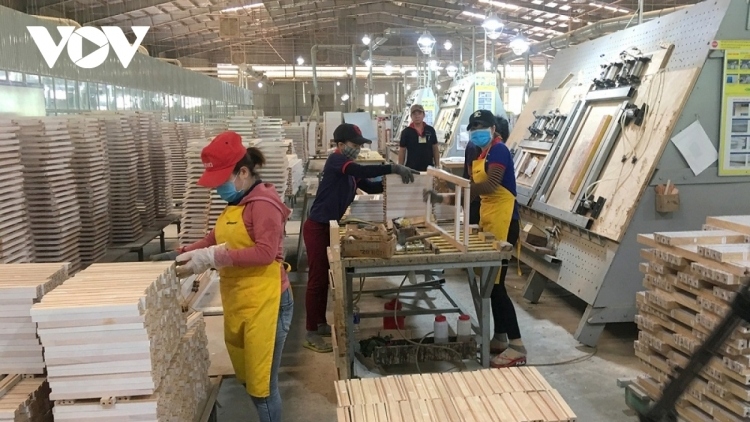Russia-Ukraine conflict adversely impacts Vietnamese wood industry
VOV.VN - Making up 10% of the global supply of wood materials, the ongoing Russia-Ukraine conflict along with the sanctions on embargoes imposed on Russia by the United States and the EU will have a strong impact on the global wood processing and export industry, including Vietnam.
Identifying the disadvantages and proposing solutions relating to mechanisms and policies to help wood enterprises reduce negative the impact from the conflict took centre stage of an online seminar held on March 9 in Hanoi by the Vietnam Timber and Forest Product Association (VIETFOREST) in co-ordination with the General Department of Forestry and the Ministry of Agriculture and Rural Development (MARD).
Vo Quang Ha, general director of Tan Vinh Cuu Joint Stock Company, said,”Birch wood from Russia must be balanced, but we can still have it. Whether we depend on Chinese sources or buy it ourselves. At the same time, the price of wood has also started to increase."
Meanwhile, Phan Thi Thu Trang, head of An Lac Wood Import-Export Department, said, "Wood materials from Ukraine in the past year have sharply increased, causing businesses to gradually reduce their output from Ukraine. This conflict happens, the output of produced wood is returned and the cost of transportation increases, leading to an increase in the price of raw materials that we buy directly from Russia and Ukraine."
According to Vu Hai Bang, chairman of the Board of Directors of Woodsland Company, the shortage of wood supply from the Russian market may create new demands for alternative types of wood imported from the Eastern European country. It is possible that Vietnamese wood sourced from planted forests can become one of the alternative sources of timber, therefore it can be viewed as necessary to devise policies aimed at supporting businesses in ensuring this supply.
"Fortunately, Vietnamese businesses that have locally grown wood and relatively stable prices over the years have not had to pay for shipping. Therefore, the MARD should have support policies to help wood processing enterprises maintain the domestic wood supply," emphasized Bang.
Bui Chinh Nghia, deputy head of the General Department of Forestry, said that it is impossible to predict how long the conflict will last and how serious the ultimate impact of it will be. Due to this it can be viewed as necessary to adopt timely mechanisms and policies aimed at helping wood businesses reduce its negative impacts, thereby contributing to the wood industry's sustainable development in the future.
According to Nghia, it remains essential to have a specific assessment and be increasingly proactive to get the best adaptations for the local wood and forest product processing industry.
The General Department of Forestry and the MARD is ready to review all opinions, then produce a joint report featuring specific proposals and recommendations regarding the adaptation in the new context.
The report will then be summited to competent agencies, the Government, and the Prime Minister, with solutions then being worked out to remove difficulties for the wood industry moving forward.

